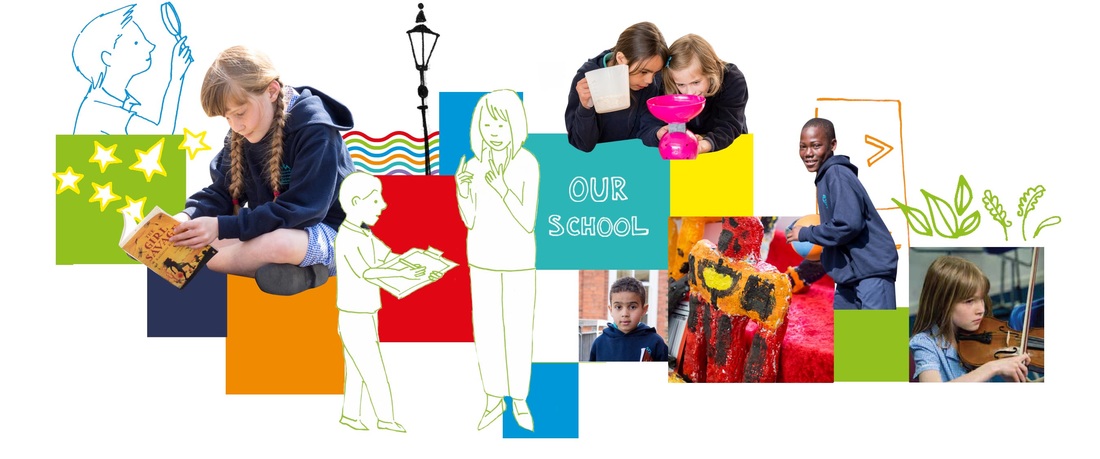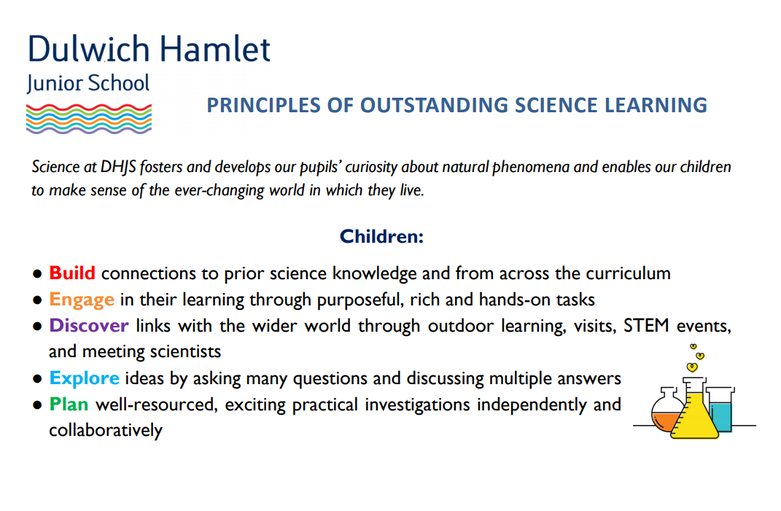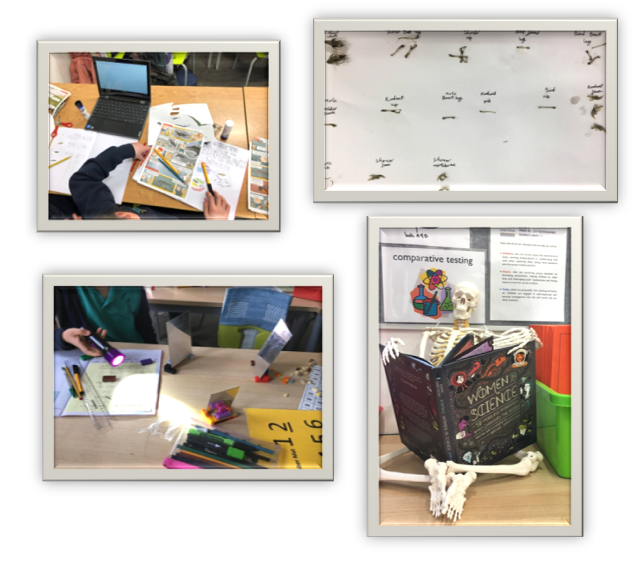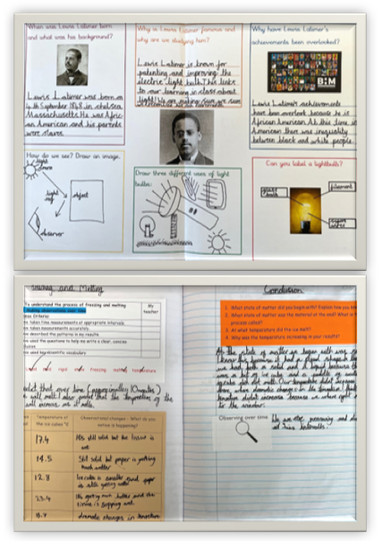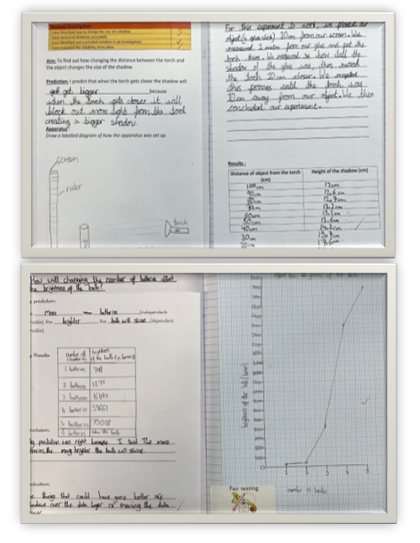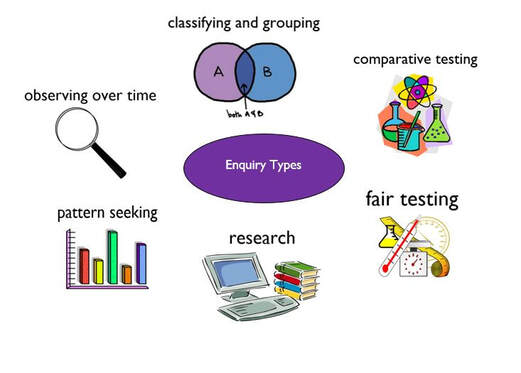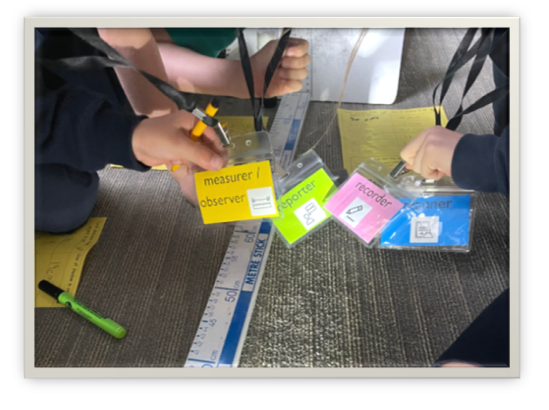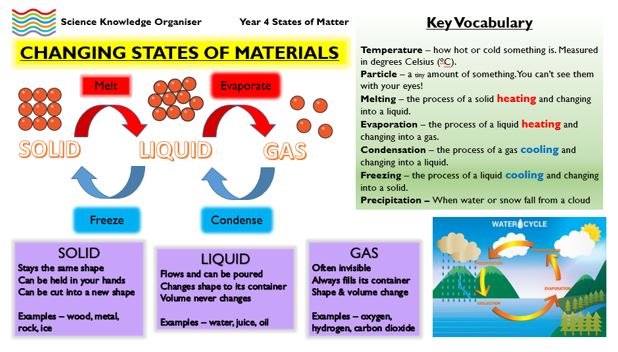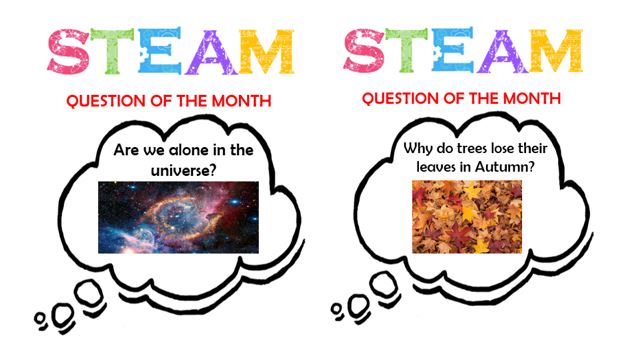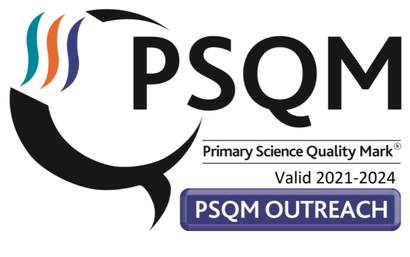Our Curriculum | English | Mathematics |
Science | PSHE | Music | PE |Art | RE | MFL | D&T | Geography | History | Computing | Extra-Curricular |
Science | PSHE | Music | PE |Art | RE | MFL | D&T | Geography | History | Computing | Extra-Curricular |
SCIENCE
|
At the Hamlet, we pride ourselves in encouraging the children’s curiosity and wonder about everyday natural phenomena. Science in our school focuses on developing children’s ideas and ways of working that enable them to make discoveries and gain a stronger sense of the world. The children are encouraged to ask and discuss questions to deepen their understanding, and to develop those all-important reasoning and justifying skills. Where possible, science is linked to class topics, to further enrich the children’s learning experiences, and throughout the year, children attend school trips and visitors meet the children to support their learning. |
Learning Science at DHJS
Vocabulary is taught explicitly to enable children to access new concepts and to have effective discussions about their learning and, in each lesson, children are given time to talk about their developing science knowledge. This prepares them for communication in investigations helping them to clearly hypothesise, plan, conclude and evaluate during different scientific enquiries. Practical activities are key to our lessons to help children deepen their understanding of scientific concepts and to experience purposeful, hands-on science that is linked to the real world.
See below for examples of outcomes in science from year groups across the school.
Vocabulary is taught explicitly to enable children to access new concepts and to have effective discussions about their learning and, in each lesson, children are given time to talk about their developing science knowledge. This prepares them for communication in investigations helping them to clearly hypothesise, plan, conclude and evaluate during different scientific enquiries. Practical activities are key to our lessons to help children deepen their understanding of scientific concepts and to experience purposeful, hands-on science that is linked to the real world.
See below for examples of outcomes in science from year groups across the school.
Knowledge
Whilst working scientifically is important, we also ensure the children develop their confidence and understanding of the core scientific knowledge and conceptual understanding of the three core subjects (biology, chemistry and physics), as well as the vocabulary that enables the children to engage in high quality scientific discussion.
Whilst working scientifically is important, we also ensure the children develop their confidence and understanding of the core scientific knowledge and conceptual understanding of the three core subjects (biology, chemistry and physics), as well as the vocabulary that enables the children to engage in high quality scientific discussion.
|
Year 3
Year 5
|
Year 4
Year 6
|
Working Scientifically
During enquiries, children may be working independently or collaboratively practising and developing the working scientifically skills. These are divided into four categories in line with our skills progression map: planning, measuring and observing, recording and reporting.
In most lessons, children will plan and complete an enquiry, working and thinking ‘like a scientist’ by following our clear investigation structure when appropriate to the scientific enquiry
Big Question → Hypothesis → Method → Recording → Conclusion → Evaluate
The enquiry types are taught and referred to regularly, and children choose the appropriate enquiry to answer the Big Question for the lesson. See below the 6 key enquiry types children use throughout their science learning.
During enquiries, children may be working independently or collaboratively practising and developing the working scientifically skills. These are divided into four categories in line with our skills progression map: planning, measuring and observing, recording and reporting.
In most lessons, children will plan and complete an enquiry, working and thinking ‘like a scientist’ by following our clear investigation structure when appropriate to the scientific enquiry
Big Question → Hypothesis → Method → Recording → Conclusion → Evaluate
The enquiry types are taught and referred to regularly, and children choose the appropriate enquiry to answer the Big Question for the lesson. See below the 6 key enquiry types children use throughout their science learning.
Science Knowledge Organisers
Knowledge Organisers are used support children in remembering and explaining key information they learn in each science unit. They include the basic key facts the children are required to know in line with the National Curriculum, along with the key vocabulary and images to support their conceptual understanding of the processes.
The Knowledge Organisers are designed in a way that can aid children’s independent revision of topics, as each area is easy for the children to cover up and reveal and symbols and images to guide them when doing so. Within the primary science curriculum, the majority of the units are linked as they move through the year groups. Therefore, the Knowledge Organisers can also be a useful resource to recap prior learning that is likely to be revisited within or linked to a new topic.
Knowledge Organisers are used support children in remembering and explaining key information they learn in each science unit. They include the basic key facts the children are required to know in line with the National Curriculum, along with the key vocabulary and images to support their conceptual understanding of the processes.
The Knowledge Organisers are designed in a way that can aid children’s independent revision of topics, as each area is easy for the children to cover up and reveal and symbols and images to guide them when doing so. Within the primary science curriculum, the majority of the units are linked as they move through the year groups. Therefore, the Knowledge Organisers can also be a useful resource to recap prior learning that is likely to be revisited within or linked to a new topic.
| Y3 - Knowledge Organisers | Y4 - Knowledge Organisers | Y5 - Knowledge Organisers | Y6 - Knowledge Organisers |
STEAM
Our children are innately curious and we need them to stay that way if we are to thrive in an ever-changing, technological world. A central aim of our primary curriculum is to nurture children so that they become independent, self-motivated scientists. An essential part of this is giving children opportunities to take the lead in their own learning and both ask and answer questions that they are interested in and wonder about. We understand and embrace the benefits to children and young people of having a mix of STEAM skills and the importance of a broad education that gives parity to science, technology, engineering, arts and maths subjects. Monthly, we share ‘big questions’ about the wider world in which we live. Children are invited to share their responses to this STEAM question, which we encourage to be as creatively and critically represented as possible. See past questions below.
Our children are innately curious and we need them to stay that way if we are to thrive in an ever-changing, technological world. A central aim of our primary curriculum is to nurture children so that they become independent, self-motivated scientists. An essential part of this is giving children opportunities to take the lead in their own learning and both ask and answer questions that they are interested in and wonder about. We understand and embrace the benefits to children and young people of having a mix of STEAM skills and the importance of a broad education that gives parity to science, technology, engineering, arts and maths subjects. Monthly, we share ‘big questions’ about the wider world in which we live. Children are invited to share their responses to this STEAM question, which we encourage to be as creatively and critically represented as possible. See past questions below.
Science beyond our school
Our Science Leader, Miss Harris, is a Specialist Leader of Education for Primary Science, supporting local schools with the development of their science curriculums, whilst leading the Southwark Science Cluster up until 2022. This cluster developed our science network, involved DHJS in research projects and both developed and deepened our teaching of and children’s learning of primary science. In May 2016, DHJS achieved the Primary Science Quality Mark Silver Award. In November 2021, we were exceptionally proud to be one of just a few schools in the UK to be awarded the prestigious PSQM - Outreach. This is an award, granted by the Primary Science Teaching Trust, which reflects the outstanding science within the school and the commitment to impact science teaching and leadership in other schools.
Our Science Leader, Miss Harris, is a Specialist Leader of Education for Primary Science, supporting local schools with the development of their science curriculums, whilst leading the Southwark Science Cluster up until 2022. This cluster developed our science network, involved DHJS in research projects and both developed and deepened our teaching of and children’s learning of primary science. In May 2016, DHJS achieved the Primary Science Quality Mark Silver Award. In November 2021, we were exceptionally proud to be one of just a few schools in the UK to be awarded the prestigious PSQM - Outreach. This is an award, granted by the Primary Science Teaching Trust, which reflects the outstanding science within the school and the commitment to impact science teaching and leadership in other schools.

